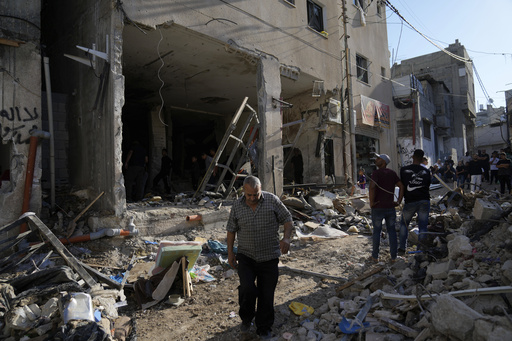TULKAREM, West Bank (AP) — An Israeli airstrike on a West Bank cafe that the military said targeted Palestinian militants also killed a family of four, including two young children, relatives told The Associated Press on Friday.
The strike slammed into a three-story building in the Tulkarem refugee camp late Thursday, setting it on fire, destroying a popular cafe and killing at least 18 Palestinians, according to the territory’s Health Ministry. It was the deadliest strike in the West Bank since the start of the Israel-Hamas war nearly a year ago.
On Friday, paramedics searched the rubble inside the blasted-out coffee shop, gathering human remains into small boxes. Young boys and men walked among the ruins of the shop, with holes in the ceiling and debris blanketing the ground, digging past bloodstained furniture and dislodged iron beams for anything to salvage.
Among the dead was the Abu Zahra family: Muhammad, a bakery worker; his wife, Saja; and their two children, Sham, 8, and Karam, 6, according to the man’s brother, Mustafa Abu Zahra, who said the family lived above the coffee shop. He added that one of Muhammad’s brothers-in-law was also in the apartment at the time and was killed.
The Israeli military said the strike killed at least nine militants who were gathering to plan an attack against Israel, including Hamas’ leader in the camp, whom it accused without providing evidence of taking part in multiple attacks against Israeli civilians. It also said a “key operative” of Islamic Jihad, another Palestinian militant group, was killed in the strike. Tulkarem, known to be a hotbed of Palestinian militancy, is a frequent target of Israeli military raids.
Hundreds of mourners packed the streets of the camp Friday during a mass funeral for the 18 killed, some brandishing Hamas flags. Hamas did not immediately claim any of the dead as its fighters but released a statement condemning the strike and calling for Palestinians in Tulkarem to rise up.
U.N. Secretary-General Antonio Guterres strongly condemned the loss of lives in the Israeli airstrike on the Tulkaram camp and called for strict compliance with international law requiring the protection of civilians and civilian infrastructure, U.N. spokesman Stephane Dujarric said.
Israel has carried out several large-scale raids in the West Bank since the start of the war in Gaza, ignited by Hamas’ Oct. 7 attack on southern Israel. While airstrikes used to be rare in the Palestinian territory, they have grown more common since the outbreak of war as Israeli forces clamp down, saying they aim to prevent attacks on their citizens.
Israeli fire has killed at least 722 Palestinians in the West Bank since Oct. 7, Palestinian health officials say. In that time, Palestinian militants have launched a number of attacks on soldiers at checkpoints and within Israel.
A shooting attack in Tel Aviv earlier this week that Israeli police said was carried out by Palestinians from the West Bank left at least six people dead.
Nimer Fayat, the owner of Dr. Coffee, said the cafe was full of “regular customers coming to eat and drink” when the strike occurred around 10:15 p.m.
“What happened was a very strong blow, the likes of which we had not seen in the past since the Al-Aqsa Intifada,” he said, using a Palestinian term for the second intifada, or uprising, in the early 2000s.
Paramedics rushing to the area encountered a ghastly scene, with body parts flung onto power lines by the force of the blast, said Nebal Farsakh, a spokesperson for the Palestinian Red Crescent, whose teams brought nine dead to the hospital.
A full list of the dead and wounded was not immediately released by the Palestinian Health Ministry.
Yasser Jibra, another relative of the Abu Zahras, said the strike was “like a lightning bolt.”
“Look around, the destruction is so obvious,” he said, adding that it was difficult to identify the bodies of his loved ones.
The Israeli military did not immediately respond to a request for comment on civilian deaths in the strike. Israel says it takes care to guard against such deaths.
But to Jibra, that means little.
“This is the work of the criminal occupation, which does not take into account the presence of a child or a woman, or an elderly or young person,” he said, as he stood inside the blasted-out cafe. “Everything is permissible for them.”
___
Associated Press reporter Julia Frankel and producer Ibrahim Hazboun contributed to this report from Jerusalem.



